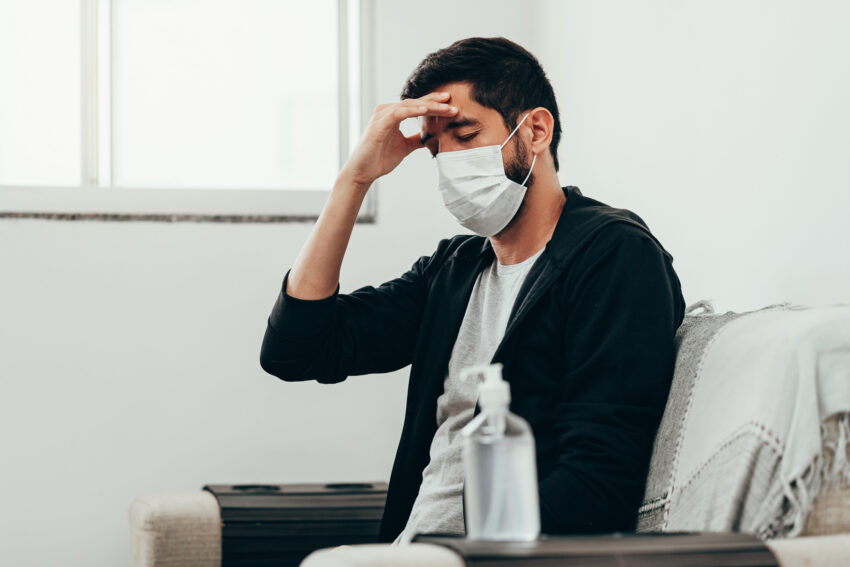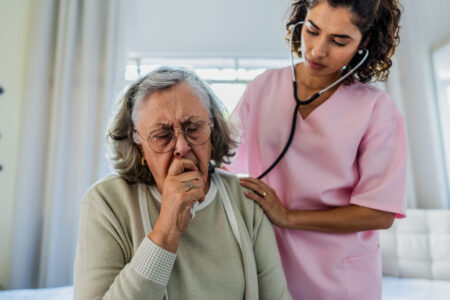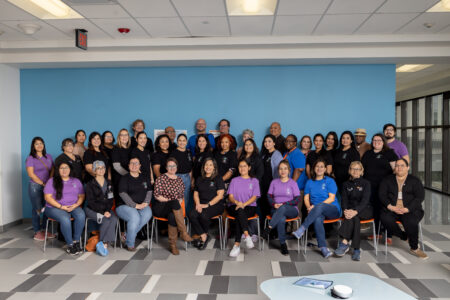
Share On Social!
When COVID-19 first struck America in 2020, Latinos were deeply affected.
Not only did the pandemic create high rates of infection, hospitalization, and death among Latinos, it also worsened historical health differences, from access to healthcare and vaccinations to food insecurity, housing issues, and incorrect information.
Today, as new variants continue to arise, an unresolved threat has emerged – Long COVID.
Let’s analyze the lingering symptoms of Long COVID-19 and how it impacts Latinos today.
What is Long COVID?
The Department of Health and Human Services, the CDC, and other partners have worked to define “long COVID” or “post-COVID conditions.”
“In April 2020, shortly after the beginning of the pandemic, anecdotal reports from patients started to emerge that previously healthy individuals were experiencing lingering symptoms and were not fully recovering from an infection with SARS-CoV-2, according to COVID.gov.
Patients with lingering symptoms called themselves “Long Haulers” and coined the term “Long COVID.”
Long COVID symptoms include different types and combinations of health problems including, but not limited to:
- General symptoms like tiredness or fatigue and fever.
- Respiratory and heart symptoms like difficulty breathing and cough.
- Neurological symptoms such as difficulty thinking or concentrating (sometimes referred to as “brain fog”) and change in smell or taste.
- Digestive symptoms including diarrhea or stomach pain.
- And other symptoms like joint or muscle pain and changes in menstrual cycles.
A comprehensive list of symptoms can be found on the CDC’s website.
What Do We Know and Not Know about Long COVID?
Health experts don’t yet fully understand Long COVID.
Most people with COVID-19 get better within a few days to a few weeks after infection.
At least four weeks after infection is the start of when post-COVID conditions could first be identified, according to CDC.
Anyone who has been infected by COVID-19 can experience post-COVID conditions.
As of now, there is no test to determine if one’s symptoms are due to COVID-19.
The CDC recommends the best way to prevent post-COVID conditions are to protect yourself and others from being infected by:
- Staying up to date on COVID-19 vaccinations.
- Avoiding close contact with people who have a confirmed or suspected COVID-19.
- Improving ventilation.
- Washing your hands with soap and water for at least 20 seconds.
- Getting tested for COVID-19, if needed.
Scientists, clinicians, and researchers are still working to learn more about post-COVID conditions and how it can affect others through research on identifying risk factors and assessing symptoms.
You can help researchers learn more about Long COVID through research studies, such as RECOVER, a National Institute of Health (NIH) study to better prevent, test, and treat Long COVID-19 in the future.
With 90 study sites in over 30 states, RECOVER is seeking up to 40,000 participants of all ages and backgrounds who have and have not had COVID-19.
“We know some people have had their lives completely upended by the major long-term effects of COVID-19,” NIH Director Dr. Francis S. Collins said in a press release. “These studies will aim to determine the cause and find much needed answers to prevent this often-debilitating condition and help those who suffer move toward recovery.”
How Is Long COVID Affecting Latinos?
Some Latinos are struggling with Long COVID.
In Colorado, nearly one-fourth (23%) of Latinos are suffering from long-term COVID symptoms, according to a survey conducted by the Colorado Latino Policy Agenda.
The same survey findings showed that Latino parents are three times as likely to suffer from long-term COVID symptoms relative to Latinos without children.
Similarly, 28% of Latinos in The Bronx reported that they had lingering symptoms, making it the highest of the city.
 The impact of long-COVID has also brought upon economic challenges for Latinos.
The impact of long-COVID has also brought upon economic challenges for Latinos.
Over a third of Latinos (36%) report they have depleted their savings due to healthcare costs, and 33% report they have lost wages due to missing work in relation to Long COVID symptoms, according to the BSP National Survey of Latino Families, sponsored by Abriendo Puertas/Opening Doors and UnidosUS.
Lingering COVID-19 symptoms can also negatively impact Latinos based on gender.
“Although Latinas are slightly less likely than Latino [men] to report that they are facing lingering COVID-19 symptoms, they are much more likely to face economic challenges due to these symptoms,” according to a blog summary of the survey data.
The survey reports:
- 24% of Latinas were more likely to have lost their job (+6% relative to Latino men).
- 36% of Latinas lost wages due to missing work (+7% relative to Latino men).
- 37% of Latinas depleted their savings to pay for health care costs (+2%).
In the case of Latino families, lingering symptoms can cause high stress among households.
The Los Angeles Times reports that elder Latinos often contribute greatly to multigenerational households, helping financially and with childcare.
Higher death rates seen within older Latinos due to post-COVID conditions can take a toll.
“It’s not just a loss of grandparents. COVID-19 took a toll on uncles, aunts, older children and others who had played vital roles in helping especially lower-income, multigenerational Latino households leverage themselves upward,” The Los Angeles Times reported.
A webinar discussing the social and economic consequences of COVID-19 for Latino families highlights another important area – mental health.
41% of Latinos are concerned about the mental health of their children amid the pandemic, according to Gabriel A. Sanchez, Rubenstein Fellow in Governance Studies at The Brookings Institution.
“It’s not surprising to see that many Latino households across the country right now are very concerned about their own mental health as well as the mental health of their children,” Sanchez said.
Moving Forward with Long COVID
With the rise of Long COVID symptoms for Latinos and others experiencing health differences, wide spread change is crucial.
“The unique challenges associated with long COVID will require flexibility from both policymakers and employers moving forward,” according to the Brookings Institute.
Brookings suggests several ways to support Latinos and others who face these health differences that worsened amid the pandemic:
- Give workers flexible resources like access to paid sick leave.
- Employers take informal steps to help retain members of their workforce who are struggling with lingering symptoms.
- Provide long-term approaches to help Latinas move out of the highly vulnerable economic standing with support in reducing childcare costs through providing federal subsidies or federal investment to expand the availability of childcare to a wider segment of families.
“This is not an easy task for employers in some instances, particularly given that Latinos tend to be concentrated in areas of the labor market, where working from home is common, but the benefits of helping keep those facing challenges with lingering symptoms are not constrained to the Latino community,” reports the Brooking Institute.
Measuring Health in Your Community
Is the area you live in experiencing health challenges?
Explore and interact with maps and data on health-related issues like COVID-19, access to healthcare, and economic status through the Salud America! Health Report Card.
Get results on what health differences look like in your county and compare them other counties and states across the nation.
Share the data with city leaders and local health departments to speak up for wide spread change in your community!
By The Numbers
142
Percent
Expected rise in Latino cancer cases in coming years



